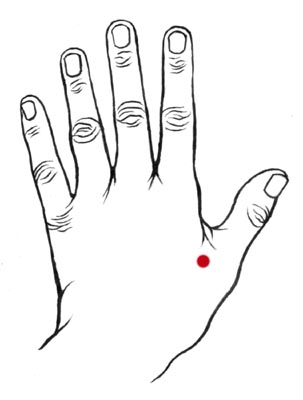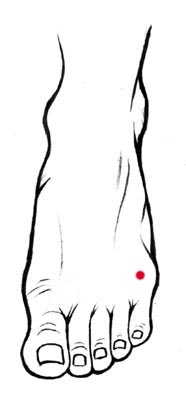|
HEALTH IN YOUR HANDS
Ubiquitous Headache Comes From Many Sources
Regardless of severity or frequency, probably everyone on this planet has had a headache at one time or another. There are those fortunate individuals who feel a minor heaviness in the head once a year, and the less fortunate ones who suffer from incapacitating migraines on a daily basis. As in all health disorders, a doctor of Traditional Chinese Medicine (TCM) will seek to find the underlying cause of any case, whether it is mild or severe, and address the source while treating the symptoms.
 He Gu, also known as LI-4, is a common headache point.
He Gu, also known as LI-4, is a common headache point.
|
From a TCM point of view, headaches can come from several different sources, far too broad to explore in one short article. Generally, we break them down into excess and deficiency patterns affecting the head. Excess patterns include wind, cold, or damp pathogens invading the head, damp stagnation or internal heat rising to the head, or blood stagnation in the head. Deficient patterns include low Blood and Qi unable to nourish the head. Each pattern manifests with different symptoms and is treated with different methods.
The key to understanding your headache within a TCM framework is to observe the nature of the headache. What factors surround the onset? Is there a particular time of day? Does it happen when you are angry? After eating particular foods? When you are tired? Before, during, or after your menstrual period? Or when it is damp outside?
What is the quality of the headache? Is it a heavy feeling? A throbbing sensation? A stretching sensation? Is it sharp or dull? Is the pain improve or get worse with pressure?
 Zu Ling Qi, also known as GB-41, is good for headaches on the side of the head.
Zu Ling Qi, also known as GB-41, is good for headaches on the side of the head.
|
What part of the head is it? The vertex? The sides of the head? Behind your eyes? All over your head?
What other circumstances occur? Does your face turn red? Or pale? Does your vision blur?
The answer to all of these questions will have a bearing of the underlying source of your headaches. Understanding the onset can help you seek ways to avoid causes: for example, if caffeine seems to cause your headache, try to reduce or remove it from your diet. Beyond these simple measures, there are several more in-depth measures you can take. However, since addressing each of the possible underlying factors of a headache is beyond the scope of this simple article, we will provide you with some basic, symptomatic treatments.
Some remedies you can try are: squirt a little bit of fresh carrot juice into your nostrils: right side for a right side headache, left side for left side headache. You can also make a tea of prunes, mint, and green tea leaves. Finally, you can try taking a half-cup of lemon juice with a half-teaspoon of baking soda. Generally speaking, you will want to avoid spicy and greasy foods, alcohol, smoking, and eyestrain. Getting plenty of sleep can also help.
 Taiyang works on headaches behind the eyes.
Taiyang works on headaches behind the eyes.
|
Basic acupressure includes gently stimulating the following points: LI-4 (hegu), located in the web between your thumb and index finger; and GB-41 (zulinqi), located above the fifth toe, near its junction with the fourth toe. You will want to rub gently in a clockwise motion. For headaches behind the eyes or on the forehead, or tension headaches running from your neck forward, stimulate GB-20 (fengchi), located where the back of the skull meets the neck, about halfway between the spine and the ear. It can also be used for headaches on the side of the head, in combination with Taiyang, located on the temples. Once again, rub gently, in a counterclockwise direction.
To address the underlying causes of your headaches, a TCM practitioner can use herbal treatment and acupuncture to bring your body back into balance and eliminate the source of your pain. However, frequent and severe headaches are serious signs, and you should consult with a medical doctor to rule out tumors or neurological problems.
|
FAQ
|

 He Gu, also known as LI-4, is a common headache point.
He Gu, also known as LI-4, is a common headache point.
 Zu Ling Qi, also known as GB-41, is good for headaches on the side of the head.
Zu Ling Qi, also known as GB-41, is good for headaches on the side of the head.
 Taiyang works on headaches behind the eyes.
Taiyang works on headaches behind the eyes.